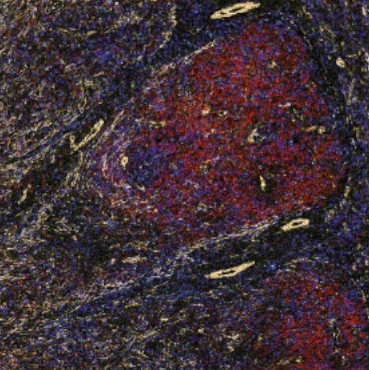Tumor heterogeneity and immune-evasive T follicular cell lymphoma phenotypes at single-cell resolution
In T follicular helper cell lymphoma, a type of blood cancer, each cancer cell is highly heterogeneous even within the same patient, and the accumulation of genetic and chromosomal abnormalities accelerates the evolution of cancer cells. We revealed that cancer cells and surrounding immune cells cooperate to create an immune evasion environment that contributes to treatment resistance.
T follicular helper cell lymphoma (TFH lymphoma) is a subgroup of blood cancer, but no standard treatment has been established and the prognosis is often poor. One of the reasons why treatment is difficult is due to variation in cancer cells between and within patients (tumor cell heterogeneity), which means each cell responds differently to treatment and that cancer cells stubborn to treatment potentially survive and proliferate. Additionly, it is thought that in cancer tissue, the interaction between cancer cells and surrounding immune cells create an environment favorable for cancer cell survival (cancer-immune microenvironment), which is also believed to be a contributing factor to the acquisition of treatment resistance. However, these findings had not been fully elucidated in TFH lymphoma until now. This study clarified and comprehensively analyzes cancer cells and immune cells in TFH lymphoma using single-cell level gene expression/mutation analysis and spatial analysis technology and obtained an overall picture of the characteristics of cancer cells and the immune microenvironment.
Results show that cancer cells in TFH lymphoma exhibit much more pronounced tumor cell heterogeneity than previously thought, that the accumulation of genetic mutations and copy number mutations promotes clonal evolution of cancer cells, and that TFH lymphoma becomes an immune-evasive environment due to increased similarity and cell proliferation characteristics, and interactions between cancer cells and immune cells. This contributes to treatment resistance. Furthermore, we also identified PLS3 as a new marker molecule that is specifically expressed in TFH lymphoma.
The results of this research will lead to the development of new treatments that target the network between immune cells and cancer cells and is expected to be applied to therapeutic development strategies for rare cancers other than TFH lymphoma. (Translated from University of Tsukuba Website - Press Release)
→
Leukemia 【DOI】 10.1038/s41375-023-02093-7
Tumor heterogeneity and immune-evasive T follicular cell lymphoma phenotypes at
single-cell resolution.
→ Research Outline (PDF In Japanese language)
